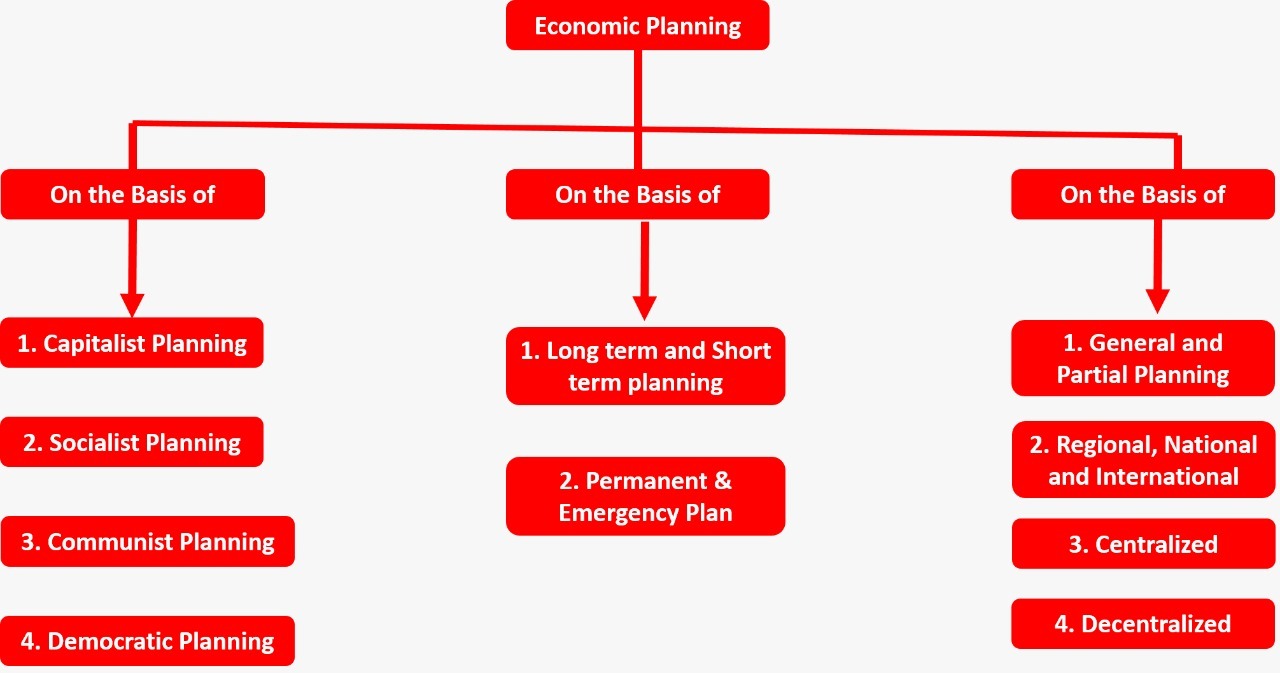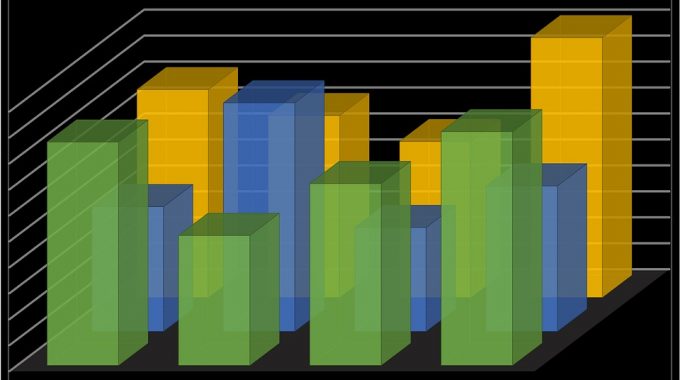In this article, I will tell you the meaning, features, importance, types, and objectives of economic planning.
Meaning of Economic Planning-
What is Economic Planning-
Economic planning is the process through which we can take the decisions of what and how it is to be produced through controlling and managing the economic activity. It is an economic programme speculated for the development of the regional economic system.
“Economic Planning is essentially a way of organizing and utilizing resources to maximum advantage in terms of social ends.”
Characteristics or Features of Economic Planning-
The features of economic planning include various points such as:-
(A) A system of Economic Organization-
In this first features of economic planning, it consists of various comprehensive activities of production, consumption, distribution, exchange, and finance are planned and defined in a coordinated manner to attain various economic and social objectives.
(B) Determination of Target and Priorities-
In this, the economic and social targets are well defined in the process of economic planning. A certain priority is also determined for these targets.
(C) Central Planning-
All the activities of economic planning are performed by the central planning authority. This authority is known as the planning commission. All the decision are taken by this authority.
(D) Certain Period-
The process of economic planning involves the determination of economic plans for a certain or specific period. For Example– In India, an economic plan is purposed for 5 years. After completing one five year plan another plan is launched.
(E) Government Regulation and Control-
Economic planning is a government affair. All plans are determined, regulated, and controlled by the government (generally central government). All the major source of data (related to economy planning) is managed by the government and its team.
(F) Economic and Social Government-
The main motive of economic planning is economic development and social welfare. All possible efforts are made to achieve balanced growth.
Importance of Economic Planning-
The importance of economic planning is also known as the scope of economic planning. It includes various points such as:-
(A) Reliable Statistical Data-
Economic planning is dependent heavily on statistic so that there can be the proper fixation of targets and priorities.
(B) Suitable Economic Organization-
The Planning commission was set up in India with the desired objective of attaining economic stability and social welfare. This organization will streamline the production, consumption, distribution, and exchange mechanism to attain desired results.
(C) The existence of Strong and Stable Government-
The progress of the nation rests on the shoulders of the central government. A strong and progressive government will provide a sound infrastructure for economic planning.
(D) Maintenance of Proper Balance-
A proper balance between agriculture and industry, public and private sector, urban and rural areas, cotton and heavy industries should be maintained thus, resulting in economic progress.
(E) Proper fixation of Target and Priorities-
Priorities are set up in the progress of economic planning. A certain priority order is determined for the attainment of these targets. The focus is on more economic and social targets.
(F) Efficient and Clear Administration-
Economic planning will be effective only when the administration is a sound one and free from the roots of corruption. All the policies should be progressive and should lay a lot of emphasis on human development.
Types of Economic Planning-

The types of economic planning are divided into three categories such as:-
1.On the basis of-
- Capitalist Planning
- Socialist Planning
- Communist Planning
- Fascist Planning
- Democratic Planning
2. On the basis of-
- Long Term & Short Term Planning
- Permanent & Emergency Plan
3. On the basis of-
- General & Partial Planning
- Regional, National, & International
- Centralized & Decentralized
On the basis of-
(A) Capitalist Planning-
It is planning adopted by the capitalist country. All the resources are managed, controlled, and regulated by private entrepreneurs or companies.
(B) Socialist Economy-
It is a specific way between capitalist planning and communist planning and also the resources are owned and regulated by the government (whether it is central or state).
(C) Communist Planning-
This types of economic planning are adopted by the communist countries. All the resources are owned, managed, and regulated by the government.
(D) Fascist Planning-
The planning is regulated, directed, and controlled by the individual. An individual is the head of the state to take efficient and important decisions.
(E) Democratic Planning-
This type of planning is adopted in mixed economies both the public and the private sector work under government rules & regulations in control. In this planning, the government provides the code of conduct to all companies for explaining the purpose of how to work in an economy.
On the basis of-
(A) Long Term & Short Term Planning-
When the plan is drafted for a long period of time. Say 5 to 10 years, it is called long term planning.
When the plan is drafted for a short period of time, say less than a year, it is regarded as short term planning.
(B) Permanent & Emergency Plan-
A permanent plan exists for a longer period of time and is fixed for a longer time period. For Example– 5-year plan.
Emergency planning is a plan which is used to deal with emergency situations such as floods, etc.
On the basis of other factors-
(A) General & Partial Planning-
It is planning for the economy as a whole and economic planning for a particular part of the economy is called partial planning.
(B) Regional, National, & International-
When the economic plan is drafted for a regional level is called Regional Planning. Similarly, the economic plan drafted for a national level is called as national planning and finally, an economic plan which is crossing the boundary of countries it is called international planning.
(C) Centralized & Decentralized-
The economic plan drafted by a central or head authority is known as centralized planning. While planning done by regional authority it is known as decentralized planning.
Objectives of Economic Planning-

The 3 main objectives of economic planning are classified as follows:-
- Economic Objectives
- Social Objectives
- Political Objectives
1.Economic Objectives-
This is the first part of objectives of economic planning and it includes various sub-points such as:-
(A) Better Utilization of National Resources-
Economic planning ensures the better utilization of natural resources such as water resources, land resources, mineral resources, and forest resources.
(B) Full Employment-
Unemployment is the root cause of concern for any nation. Economic planning ensures full employment opportunities to prospective employees with desired skills and abilities.
(C) Promoting Balanced Development-
There should be balanced between agricultural and industrial development, rural and urban development, economic and social development, and so on.
(D) Minimizing Economic Inequalities-
Effective economic planning leads to minimization of inequalities that results in differences in the distribution of wealth and incomes. The ultimate objectives of economic planning are that wealth should be distributed equally among the masses.
(E) Maximum Production & Productivity-
Economic planning can result in better utilization of resources and appropriate use of technology to increase the production and enhancing the productivity of employees.
(F) Promoting Standard of Living-
Economic planning ensures a better quality of products is provided to the various members of the society ensuring a better standard of living.
(G) Attaining Self Reliance-
The best efforts are made to promote exports and to channelize industrial development of the country in such a manner that dependence on imports is minimized.
(H) Economic Security & Stability-
It ensures fair remuneration to workers, a fair return to investors, reasonable returns to entrepreneurs.
2. Social Objectives-
This is the second part of objectives of economic planning and it includes various sub-points such as:-
(A) Social Security-
It deals with old age, pensions, unemployment, allowances, accidental insurances, and so on.
(B) Social Welfare-
Economic planning ensures better facilities in education, accommodation, medical, recreation, transport facilities, and so on.
(C) Social Equality-
Equal opportunity for development is provided to way citizen of the country irrespective of the caste, religion, gender, and so on.
3. Political Objectives-
This is the third part of objectives and it includes various sub-points such as:-
(A) Promoting Defense-
Defense from for foreign attacks and aggression is an important objective of economic planning.
(B) Promoting Internal Peace-
Maintenance of law, order and internal peace is an essential condition for a social and economic department.
(C) Satisfying the Political Ego-
Economic planning has been adopted by different political parties as a tool to satisfy their political ego. There are various changes in economic plans and policies a change in government.
So, these are the objectives of economic planning.
Also Read-




Mashallah U Have Done Good Work Keep It Up May Allah Give U More Dare To Work More In The Field Of Education
Thank you so much for your valuable comment sir….